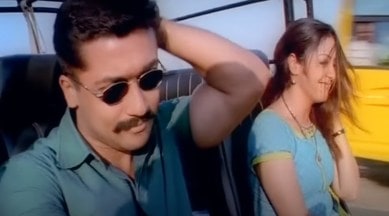Click here to follow Screen Digital on YouTube and stay updated with the latest from the world of cinema.

Kaakha Kaakha will turn 20 in two weeks, which will mark two decades of Suriya being one of the most successful stars of Tamil cinema. Son of the 1970s top Tamil star Sivakumar, Suriya might have gotten into the industry pretty easily with his debut film Nerukku Ner (1997), which also had Vijay in the lead role but things didn’t turn out well for the actor despite a hit debut. His subsequent films–Kaadhale Nimmadhi (1998), Sandhippoma (1998), Periyanna (1999), Poovellam Kettuppar (1999), and Uyirile Kalanthathu (2000)–failed at the box office.
Vijay teamed up with Suriya again to make Friends (2001), however, the success was Friends was attributed to the main hero of the film, Vijay. When people started to wonder if Suriya could actually make it, Bala’s Nandha (2001) changed his perception. The quaint boy-next-door guy of Poovellam Kettuppar had suddenly transformed into a taciturn macho figure. There was an immense change in his body language. And, of course, the actor had beefed up significantly. Suriya became a different person. However, Nandha was not enough to deem Suriya a star yet. He had to wait for one more year for his day. And that happened with 2003’s Kaakha Kaakha.
Directed by Gautham (he wasn’t Gautham Vasudev Menon back then), Kaakha Kaakha was not a watershed moment just for Suriya, it was for the whole of Tamil cinema. The making and style were completely new to Kodambakkam. To embark on a road trip on a convertible jeep, like the lead couple of the film, became one of the ‘couple goals’ for many. Gautham was compared to Mani Ratnam for having a unique style and feel in his films–especially the romantic portions.
Another major factor that made the film a hit was its music. Harris Jayaraj, who was emerging as the next big thing in the Tamil music scene, delivered songs that have become the modern classics of Kollywood. Cinematographer RD Rajasekhar, who was introduced by Gautham in Minnale, elevated Harris’s music with his brilliant visuals. Be it the dreamy sequences of Ennai Konjam Maatri or the gruesome violence in the film, Rajashekhar’s camera work brilliantly complemented the two extremes in the film. On top of that, the film was also the debut of editor Anthony, who would go on to become a much sought-after talent. Kaakha Kaakha changed a lot in Tamil cinema.
The film opens with Anubuselvan IPS (Suriya) plunging outside of a wooden house with a bullet wound. The sequence is dark and gloomy. Anbu drowns in the lake, and as he opens his eyes, he sees a lady swimming towards him. Harris’s gibberish ‘Omagasiya’ starts and the bleak scene turns into something erotic. Tamil cinema fans had never watched something like this before. After the song, the couple runs into the lake, and Anbuselvan wakes up and we’re back to the story. It was one of the clever ways to have a song without disrupting the momentum of the film.
As Anbuselvan fights for his life lying in a pool of blood, he starts narrating his story. The narration became iconic, with lines like ‘Naanga naalu peru, engaluku bayamna ennanae theriyaathu’ becoming a huge rage among fans. Kaakha Kaakha sold a different brand of heroism, where the hero was not mouthing some one-liners and sending goons up in the air. It had style and sophistication that people hadn’t seen before. Of course, Gautham was immensely inspired by American movies, but finally, there was someone who could do it right. Even after two decades, the film still holds water. Though the glorification of the police force and extra-judicial killings in the film would raise eyebrows now, Kaakha Kaakha continues to be an entertaining film.
In Tamil cinema, the moment an actor plays a cop and the film works, it means he has been promoted to a hero status. He now has people’s permission to be a mass hero. That is exactly what happened with Suriya. As Anbuselvan walks back after killing his nemesis and Sathyaraj’s voice-over begins, “Police vaalkayum oru porkalama thaan… konjam vithyasamaanathu”, it became apparent that the actor was no longer the guy next door or a supporting role material anymore or just the son of Sivakumar, he had become a star.
Click here to follow Screen Digital on YouTube and stay updated with the latest from the world of cinema.